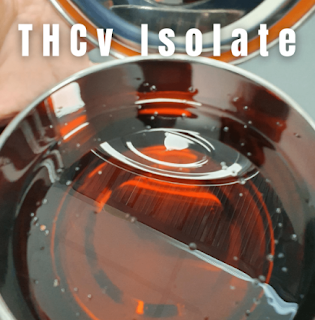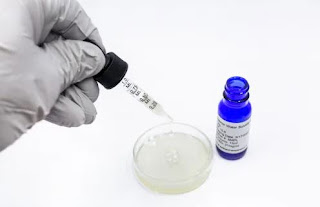ALL ABOUT THCV | BONA VOLUNTATE
THCV is a cannabinoid that is gaining popularity among both academics and cannabis users. This unusual chemical is generally found in trace amounts in cannabis strains, but its medical potential are quite intriguing. Is THCV Isolate gaining popularity in the same way as CBD and THC have?
What Exactly is THCV?
Despite being a close relative of THC, tetrahydrocannabivarin (THCV) provides a distinct sensation. THCV Isolate produces a psychotropic effect only at greater doses. In small doses, the cannabinoid has a noticeable effect. Until recently, THCV Isolate was only found in some landrace strains and wild-type plants. In the meantime, contemporary hybrids provide higher amounts and more favourable effects. You'll learn everything there is to know about this emerging cannabinoid and the strains that can be used to enjoy it.
What is the source of THCV?
THCV is made in the same fashion as the other cannabinoids, but with different components. Cannabigerovarian acid (CBGV-A), one of the two precursor cannabinoids, is the starting point for THCV.
CBGA, on the other hand, is the precursor to THC, CBD, and CBC.
Enzymes convert CBGV-A to THCV-A in the same way as CBGA is broken down (tetrahydrocannabivarin acid). Decarboxylation is the process by which THCV-A is transformed to THCV. Decarboxylation is the process of heating or exposing the chemical to sunshine.
What's the distinction between THCV and THC?
The fundamental chemical difference between THCV and THC is that THCV has three carbon atoms instead of five in its molecular structure.
In terms of effects, THCV can be just as psychoactive as THC, generating an even more powerful and psychedelic high, albeit for a shorter period of time.
THC and THCV both operate on the endocannabinoid system's CB1 and CB2 receptors. THCV, on the other hand, works as an antagonist of the CB1 receptor rather than an agonist like THC at low doses. This suggests that modest amounts of THCV Isolate may mitigate THC's psychoactive effects. Low doses can also help to alleviate THC's unpleasant side effects like anxiety, paranoia, elevated heart rate, and even excessive appetite. In higher doses, however, THCV becomes an agonist of the CB1 receptor (like THC) and so becomes psychoactive.
THCV has a boiling point of 220°C, which is greater than that of THC. When smoking THCV-rich concentrates, keep this in mind because the high temperature may cause other cannabinoids and terpenes to burn out.
What are the Effects of THCV?
THCV research is more limited than that of other cannabinoids. THCV, like many other members of this chemical family, binds to receptors in different organs and systems, including the brain and immune system. This connection has the potential to be helpful to the body.
According to research published in the International Journal of Neuropsychopharmacology, it serves as an appetite suppressant [1] and may affect reward and aversion pathways in the brain linked to obesity and eating disorders.
Researchers used magnetic resonance imaging and subjective assessments to measure brain response to rewarding and unpleasant stimulation related with eating in a double-blind research in healthy participants. THCV Isolate was able to increase their neural responses to unpleasant stimulus while diminishing their reward response to food at low doses (and again as a CB1 antagonist). While these findings deserve further examination, they do imply that THCV may have a therapeutic role in obesity.
Furthermore, THCV may contribute to the regulation of blood glucose level processes [2], as a research in diabetic patients found that THCV dramatically reduced fasting plasma glucose and enhanced pancreatic function in type 2 diabetes patients.
Different ratios of THCV and CBD were employed in randomised, double-blind, placebo-controlled trials on 62 diabetic patients to measure changes in cholesterol levels, insulin sensitivity, liver triglyceride levels, and other critical health markers. According to the study, THCV improved all functions while leaving plasma HDL unchanged. While more research is needed to back up these findings, they imply that THCV could be a new glycemic control medication in type 2 diabetes.
Finally, a study was conducted to assess the effect of THCV on psychotic states [3], both in vivo on rats and in vitro on rat and human cell cultures.
The cannabis reduced stereotyped behaviour, lowered time spent stationary in a forced swimming test, and regulated hyperactivity, social behaviour, and cognitive function in rats, according to the study. In vitro findings also suggest that the cannabis increased the activity of the 5-HT1A receptor, thereby partially inhibiting the effects of a neurodegenerative artificial agent.
This findings will need to be confirmed by other laboratory testing and, most likely, clinical tests on patients. However, these encouraging findings suggest that THCV has the potential to improve and lessen the catastrophic cognitive symptoms of schizophrenia in humans.
Is THCV psychoactive?
There have been very few investigations on the psychological consequences of THCV to yet. However, our current understanding indicates that the THCV Isolate molecule's effects vary with dose.
THCV, like CBD, can lessen some of THC's usual effects, while higher amounts can generate a euphoric state of mind that comes on swiftly and fades out quickly. In contrast, most THCV-rich strains are said to produce a quick high of explosive intensity with no sedative effects.
The Potential Advantages of THCV
Although current laboratory data do not support significant therapeutic applications, the main potential of THCV resides in appetite suppression and the reduction of anxiety, depression, or post-traumatic stress disorder. As a result, many additional research, combined with user experience reports, are required to confirm the possible benefits.
Is THCV legal to use? Is THCV detected in drug testing?
In many nations, the legality of THCV is debatable. THCV is not included in the International Convention on Psychotropic Substances, but due to its comparable chemical structure to THC, it could be regarded an equivalent. You could be prosecuted for possession if you live in a less tolerant country.
There are no particular drug tests for THCV Wholesale, and it is unclear if THCV may be detected by a drug test. Because THCV levels are often low in cannabis strains, it is not a good predictor of cannabis consumption [4]. As a result, a drug test should not confuse THCV with THC, but we cannot be certain.
Where can you find THCV?
Most popular strains now contain less than 1% THCV, making bulk extraction of this cannabinoid prohibitively expensive. THCV levels were observed to be higher in the progeny of pure sativa landraces from Africa and Nepal.
Bred hemp strains with high THCV and low THC levels are among the new issues confronting cannabis breeders, however a few strains are currently being bred especially to create higher levels of THCV Wholesale and THC. If you want a high THCV strain, seek for pure sativa genetics, but keep in mind that cannabinoid levels can vary from harvest to harvest. Again, grow settings that replicate tropical temperatures have a better probability of producing more THCV.
THCV levels in strains such as Durban Poison, Jack the Ripper, and the rare Doug's Varin are among the highest. African sativas such as Power Flower (a descendant of Jack the Ripper like Mother Gorilla) or Durban Poison (like Bona Voluntate Cookies) should also produce significant THCV levels. Only Doug's Varin, however, was bred expressly for THCV. As a result, there are currently no THCV isolates or pure THCV Wholesale extracts on the market.
Where to Find THCV: Learn about Bona Voluntate THCV.
The development of uncommon cannabinoids like THCV has piqued the interest of many cannabis consumers. These chemicals have distinct impacts and will undoubtedly enhance the cannabis experience. Most strains, however, only have negligible levels of THCV. Even the landrace and wild-type strains with the highest concentrations of this chemical only contain up to 1%, thus breeders had to put in a lot of effort to generate variations with substantial values.
Fortunately for users seeking this cannabinoid, the breeders at Bona Voluntate were enthusiastic about their job. They created Bona Voluntate THCV by crossing a pure African sativa with Durban Haze and then stabilising the progeny. This very sativa-dominant hybrid produces dense colas with 7% THCV levels and the same amount of THC. This delicate cannabinoid combination produces a gentle high without overwhelming the consumer. Overall, these buds produce an energetic effect as well as a creative state of mind, making this strain ideal for daytime usage. THCV supplementation suppresses appetite and has a noticeable effect. The encounter is accompanied with earth, fruit, and herb flavours.
When it comes to cultivation, Bona Voluntate THCV Wholesale makes things easier for farmers. She grows to a height of 80-120cm indoors and can produce up to 500g/m2 when grown under excellent lighting.
Is there Hope for THCV?
THCV is gaining popularity, but studying its effects is difficult by its scarcity and antiquated restrictions.
THCV certainly has medical potential, albeit it, like other cannabinoids, requires significantly more research. THCV Wholesale may also be a new stimulant, albeit it may not be the greatest choice for individuals who want to avoid any form of high.
Will this cannabinoid be as popular as the other two in the future? It's difficult to say, but we're intrigued.




Comments
Post a Comment